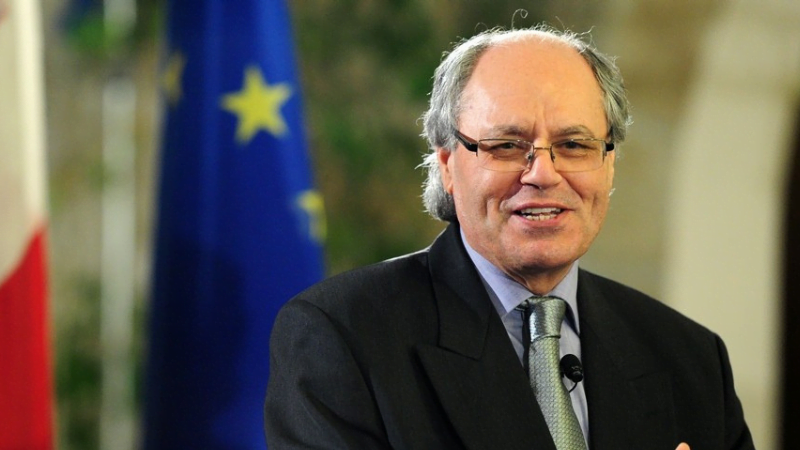Finance Minister Edward Scicluna has dismissed Malta’s money laundering woes by implying that it was fine because it happened everywhere else as well.
“Everyone has issues… in London it’s Russians and property,” Scicluna told London-based newspaper The Telegraph.
“I sometimes joke,” he added, “that we have more regulators these days than practitioners, but still we get a lot of criticism. I do not know of any jurisdiction that can put its hand on its heart and say we don’t have any money laundering here.”
Scicluna provided no figures to back his claim that there are more regulators than practitioners. A report by Moneyval – the Council of Europe’s panel of experts on the Evaluation of Anti-Money Laundering Measures and the Financing of Terrorism – in fact highlighted the lack of resources allocated to the fight against money laundering only last month.
The Shift has revealed millions in direct orders signed off by Scicluna to address the problem.
Scicluna, who is currently appealing a magisterial decree placing him under criminal investigation for behaviour that “falls under the definition of money laundering” in the shady Vitals Global Healthcare deal, made the statement to journalist Jeremy Warner from The Telegraph.
The Shift News exposed how a concession for three public hospitals worth €70 million a year for 99 years, was sold for just €1, while millions in payouts were made to a network of companies revealed to belong to those behind the original concession.
Following The Shift’s investigation, a magisterial inquiry has been ordered into the conduct of Scicluna, Economy Minister Chris Cardona, and Konrad Mizzi in terms of the “inadvisable, underhand deal”. All are appealing the decision.
Scicluna also refers to the controversial Electrogas deal in his comments to The Telegraph: “By closing our two oil-fired power stations and replacing them with gas, we reduced our energy costs by 25%”.
The Finance Minister was referring to a deal described by Dutch MP Pieter Omtzigt in his Council of Europe report as “sinister” and “highly irregular”.
Scicluna failed to mention the fact that Malta has been paying almost twice the market price for gas from Azerbaijan state-owned company SOCAR, with taxpayers footing the bill. He also failed to mention that Electrogas is one-third owned by Socar.
He also left out the fact that the Council of Europe report observed a number of similarities between the energy deal and the VGH deal, noting that both were signed and negotiated by Konrad Mizzi.
The Shift had revealed that Mizzi had personally signed the agreement between the government and SOCAR Trading for the supply of liquified natural gas (LNG) to the Electrogas power station for 18 years, a concern raised by the anti-money laundering agency FIAU in a report that was buried and presented to a magistrate by PN MEP David Casa.
The Panama Papers investigation exposed Mizzi and the Prime Minister’s chief of staff Keith Schembri owning secret offshore companies set up a few days after the Labour Party was elected in 2013 on the promise of transparency, accountability and meritocracy.
The companies owned by Mizzi and Schembri were set to receive payments of €150,000 per month from Dubai company 17 Black. It was then revealed by the press that 17 Black was owned by Yorgen Fenech, owner of the Tumas Group, a member of the Electrogas consortium. The owner of a second company set up for the same purposes, MacBridge, is as yet unknown.
The controversial cash-for-passports scheme was also raised in Scicluna’s interview – a scheme criticised by the European Commission, the European Parliament and the Council of Europe.
Scicluna’s defence was that “lots of countries do this”. He sais he found it “more obscene to accumulate debt than finding a way of reducing it”. He was referring to the fact that Malta profits handsomely from the sale of European passports.
In terms of security, Scicluna claimed that over 1 million people obtain EU citizenship each year through naturalisation and that “few of them are scrutinised for their history, moral uprightness and skills”. He failed to mention the requirements associated with citizen through naturalisation, which relies on connections to the country and years of living in Malta before even being considered.
Interestingly, Scicluna was parroting the line by Christian Kalin, Chairman of Henley and Partners, the concessionaire for the Maltese citizenship scheme. In an interview given to Forbes in July, Kalin said:
“The EU gives about 1 million citizenships a year. Most are legitimate but tens of thousands are not, and that’s the real problem in Europe.”
Scicluna then claimed that the Maltese authorities subject everyone to “vigorous procedures” and that they turn down a quarter of applicants, approving “only 300 people a year”.
Scicluna told The Telegraph that those applying for Maltese citizenship are “highly successful” Chinese, Russians, and South Africans. Reality is something else.
In August, Egyptian national Mustafa Abdel Wadood pleaded guilty to fraud and money laundering after his arrest in the US only a few weeks after he was granted Maltese citizenship.
The previous month, Chinese billionaire Liu Zhongtian was arrested for $1.8 billion in aluminium tariff fraud. He received Maltese citizenship in 2016, listed as living in a small, seedy flat in Naxxar, despite his immense wealth, first revealed by assassinated journalist Daphne Caruana Galizia.
Last year, Pavel Melnikov, a Russian with a Maltese passport had his Finnish company raided on suspicion of financial crimes. Melnikov claims residence in Hungary and has a network of “bizarre structures” including property and companies in Latvia, Poland, Finland, and Russia, according to press reports.













